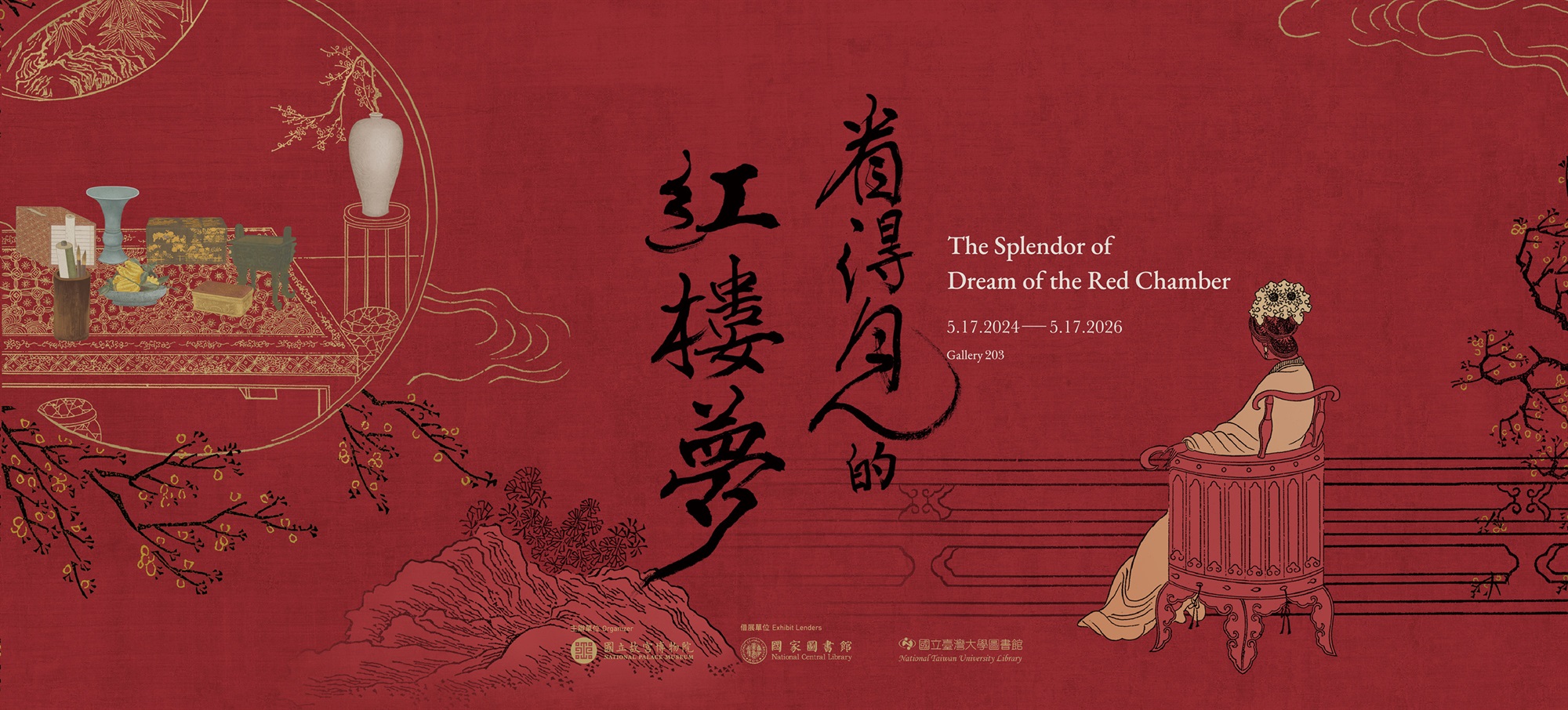A Fancy Dream
“When illusion is construed as reality, reality becomes illusion (假作真時真亦假, jia zuo zhen shi zhen yi jia).” This is a famous phrase from Dream of the Red Chamber implying that the details in the novel can be interpreted as being real as well as fictional. Cao used the allegorical tale of a forsaken stone reincarnating into the human world to tell us stories from the real world, the story of the waxing and waning of wealth and prestige; the story of beauty and sadness of the lives of women; the story of life’s tragedy, which comes in many forms. To bring the stories to life, Cao particularly chose many specific objects and materials such as pouches, accessories and the Buddha’s hand citron to create distinct silhouettes and personalities for each character. They also serve symbolic purposes and connect the plot. The presence of these “objects and materials” are thus palpable throughout the novel, attaching fiction to reality.
-
The Debt of Tears – Jia Baoyu and Lin Daiyu
Silk Embroidered Pouch with Gold and Silver Threads
Qing Dynasty (1644-1911)
Zhong Za 68
Length 10.8 cmDream of the Red Chamber is a story about the debt of tears. A stone which was forsaken by goddess Nuwa after she mended the collapsed heaven decided to water a crimson pearl herb by the rocks along the Ling River, thus sustaining its life. When the stone reincarnated into the earthly realm, the herb followed, intending to repay this debit with a lifetime of tears. The benevolent act and the determination to repay such benevolence reincarnated into the kindred spirit between Jia Baoyu and Lin Daiyu, and grew with them into soulful love. They were “inseparable day and night,” reading together; mourning flowers together; writing poetry together, until “all tears are shed; all debts are repaid.”
A pouch is an accessory carried by the Manchus. For males, a pair was worn with one on each side of the belt. Lin Daiyu once handsaw a pouch for Jia Baoyu. When Lin Daiyu thought he regifted the pouch, she returned to her room with fury. In fact, he had been wearing it around the collar of his inner clothing so that no one could take it, protecting the pouch carefully by keeping it close. “Tears welled up in her eyes, and her breath was slightly labored.” This is the description of Lin Daiyu when Jia Baoyu first meets her. Born into a family of hereditary nobility, Lin Daiyu is the beloved granddaughter of Grandmother Jia. She is ethereal and otherworldly, but she is often sick and tearful. Frail and rarely engaging in needlework, the fact that she “worked on a pouch over the course of a whole year” makes the pouch she stitched for Jia Baoyu even more precious.
-
A Mountain Recluse of Pristine Virtues—Xue Baochai
Jade Pei Pendant in the Shape of a Lock
Qing Dynasty (1644-1911)
Gu Yu 8642
Length 8.2 cm Height 4.6Xue Baochai always wears a gold locket engraved with “leave not, forsake not, forever endures the blossoming youth.” This perfectly pairs with “lose not, forget not, long thrives the immortal life,” on Jia Baoyu's jade, evoking the idea of “an ideal union of gold and jade.” Born into a prestigious family of imperial merchants, Xue Baochai has received a good education from an early age, making her the most learned female character. With a noble character, she is fond of tranquility and elegance. Cao Xueqin describes her as plain in appearance, “never fond of flashy adornments,” and her room is furnished “like an austere snow cave, devoid of any decorative items.” All these suggest Xue Baochai's refined taste, integrity, and pursuit of a simple life.
Two auspicious lines, “leave not, forsake not, forever endures the blossoming youth,” were given to Xue Baochai by a Buddhist monk, who said they should be engraved on a gold object, with one line on each side. Such lock-shaped ornaments inscribed with auspicious phrases are not mere figments of imagination. This jade pendant in the shape of a lock features a peony on one side and is inscribed with “yu tang fu qui (high rank and prosperity)” on the other. It is strung on a cord for wearing around.
-
The Epitome of Craftiness—Wang Xifeng
Gold Earpick-hairpin Decorated with Characters of “Peace”
Qing Dynasty (1644-1911)
Gu Za 2107
Length 10.3 cmWang Xifeng, the favored daughter-in-law of Grandmother Jia, serves as the manager of the Jia household. She is intelligent, capable, lively, and beautiful, always bringing laughter wherever she goes and radiating charm in every aspect of her appearance. Hailing from a noble family, the Wangs were even involved in the preparations for the emperor’s southern inspection tour, underscoring their ties to the imperial court and emphasizing Wang Xifeng's glamorous upbringing. Wang Xifeng meticulously managed the household finances, oversaw every expenditure to support the extensive costs of the Jia household, maintain their stability, and mitigate the decline of the family. Despite her tireless efforts, she could not salvage the Jia family or avert the tragedy of her eventual divorce.
Wang Xifeng's beauty often carries a hint of spontaneity and indulgence. In Chapter 28, Jia Baoyu walked to Wang Xifeng's courtyard and saw “Wang Xifeng resting on the doorstep, using an earpick to clean her teeth…” Earpicks are often paired with hairpins as a set. This gold earpick-hairpin features a rounded end that serves as the earpick, while the other end is adorned with two Chinese characters, “ping an,” which symbolize peace.
-
A Peony Bed of Drunken Dream—Shi Xiangyun
Round White Silk Embroidered Fan with Flower and Butterfly Design Inlaid with Pearl and Jadeite
Qing Dynasty (1644-1911)
Gu Za 5970
Length 38.5 cm Height 21.5 cmIn Dream of the Red Chamber, four prominent families stand out: the Jia, Shi, Wang, and Xue. Shi Xiangyun was born into the Shi family, where Grandmother Jia, officially known as Shi Taijun, is an elder member. Despite being orphaned at an early age, Shi Xiangyun exudes a broad-minded and cheerful demeanor. This is why the author especially mentions her as “fortunate to be born with a heroic and magnanimous disposition.” Among all the main female characters, she embodies the most positive traits. Shi Xiangyun laughs heartily, eats venison heartily, dresses in men's clothing, and when drunk, lies down on a stone bench to sleep soundly. She is so uninhibited, so genuine. Unfortunately, she still leads a lonely life in the end.
The scene of Shi Xiangyun lying drunk among the peony petals is a charming passage in the novel. “Peony petals fly all around her, covering her from head to toe, scattering their fragrance on her face and clothes. The fan in her hand lies on the ground, half-buried under fallen flowers, while a swarm of bees and butterflies buzzes around her in a noisy frenzy.” The round fan not only provides cooling relief but can also shield one's face and serve as a prop for feminine posturing.
-
The Yearning of Vain Destiny—Hua Xiren and Qingwen
Gilt Silver Openwork Fingernail Guard with Cotton Rose Motif
Qing Dynasty (1644-1911)
Gu Za 3610, 3611
Length 8.2 cmHua Xiren and Qingwen are Jia Baoyu's principal maids, his prospective concubines, who rise from servant status to be counted as major female characters. Hua Xiren is simple, wise, and considerate; Qingwen is charming, proud, and competitive. Despite their lowly origins, they have different destinies due to their contrasting personalities. After the downfall of the Jia family, Hua Xiren married the actor Jiang Yuhan; Qingwen, even before the downfall, was unjustly driven away and died of illness on a reed mat at home. To Hua Xiren, “the enviable actor was blessed to marry her, while the young master lacked the destined connection.” To Qingwen, “her short life was due to slanderous accusations, and the sentimental young master missed her in vain.”
Qingwen is delicate and charming. Despite being a maid, she is pampered by Jia Baoyu and “dressed up like a Xi Shi every day,” even “sporting two fingernails that are three inches long…” This demonstrates Qingwen's fondness for dressing up and her privileged status. Long nails are a symbol of noblewomen and require careful maintenance, often protected by nail guards. Fingernails symbolize Qingwen's dignity and her very essence. Mistakenly accused of having an affair with Jia Baoyu, she was expelled from the Jia family by Lady Wang. On her deathbed, in Jia Baoyu's presence, she cut off her two “scallion-like” long fingernails, declaring, “take these, and it will be as if you are seeing me.” This act embodies Qingwen's unwavering pride and unyielding spirit, which soars “higher than the sky.”




